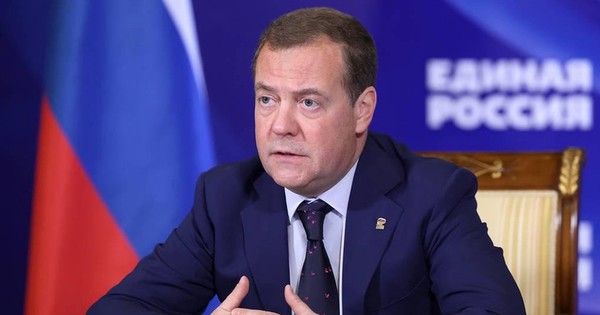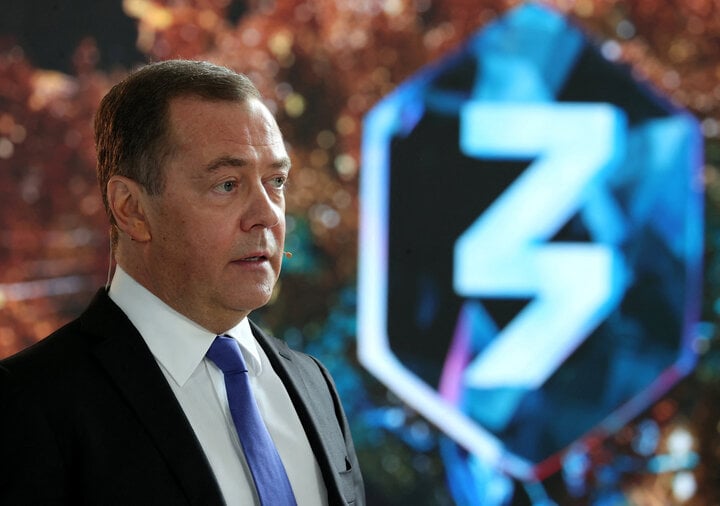[Sau tuyên bố của ông Medvedev, CIA lo sợ Nga xài vũ khí hạt nhân ở Ukraine]

Executive Summary

Recent statements by Dmitry Medvedev, Deputy Chairman of the Security Council of Russia, have sparked significant concern within the CIA and the international community regarding the potential use of nuclear weapons in the ongoing Ukraine conflict. Medvedev’s rhetoric, while often provocative, has raised the stakes considerably, prompting a reassessment of Russia’s strategic intentions and the potential for catastrophic escalation. This article delves into the anxieties surrounding Medvedev’s pronouncements, exploring the geopolitical implications, the CIA’s likely response, and the wider consequences of a potential nuclear deployment in Ukraine. We will analyze the key subtopics fueling this escalating tension, examining the context, the players involved, and the potential outcomes. This analysis aims to provide a comprehensive understanding of the situation and its far-reaching implications.

Introduction
The war in Ukraine has reached a critical juncture. Dmitry Medvedev’s recent statements, hinting at the potential use of nuclear weapons by Russia, have sent shockwaves through the global community. The CIA, tasked with assessing and mitigating such threats, is undoubtedly on high alert. This escalating situation demands careful scrutiny, examining not just the immediate implications, but also the long-term consequences of such a drastic and unprecedented move. The potential for nuclear escalation warrants a thorough investigation into the strategic calculations underpinning these alarming pronouncements.
FAQ
- Q: What specific statements by Medvedev have caused such concern?
A: Medvedev’s statements have been deliberately vague, yet alarming. He has employed rhetoric suggesting Russia might be forced to use nuclear weapons if certain “red lines” are crossed – lines that remain undefined, leaving room for broad interpretation and fueling speculation. This ambiguity, rather than clarifying Russia’s intentions, has only intensified anxieties.
- Q: What is the CIA’s likely response to this heightened threat?
A: The CIA’s response is likely multifaceted. It will involve intensified intelligence gathering to monitor Russian military movements and communications, increased surveillance of nuclear facilities, and strengthened collaboration with international partners to coordinate responses and share intelligence. Diplomatic efforts to de-escalate the situation will also likely be intensified.
- Q: What are the potential international consequences of Russia using nuclear weapons in Ukraine?
A: The use of nuclear weapons in Ukraine would have devastating consequences, far beyond the immediate impact on the conflict zone. It would likely trigger widespread condemnation, severe international sanctions, and potential military responses from NATO allies. The global security architecture would be fundamentally altered, leading to a period of profound uncertainty and instability. The humanitarian crisis would also reach unprecedented levels.
Medvedev’s Rhetoric and Its Strategic Implications
Medvedev’s pronouncements are not simply bluster; they serve a crucial strategic purpose. Understanding this purpose is essential for grasping the depth of the current crisis.
- Information Warfare: Medvedev’s statements are a powerful tool in Russia’s information warfare campaign. By introducing the nuclear card, he aims to sow fear and uncertainty, undermining the resolve of Ukraine and its allies.
- Domestic Politics: The pronouncements also serve a domestic audience. They project an image of strength and unwavering resolve, crucial for maintaining public support amidst a protracted and costly war.
- Pressure on the West: The threat of nuclear escalation is intended to pressure Western powers to curtail their support for Ukraine, potentially leading to negotiations favorable to Russia.
- Shifting the Narrative: Medvedev’s rhetoric seeks to shift the narrative surrounding the conflict, portraying Russia as a victim forced to resort to extreme measures due to Western provocation.
- Red Line Ambiguity: The vagueness surrounding Russia’s “red lines” keeps the West perpetually on edge, creating a climate of constant anxiety and uncertainty.
- Deterrence and Coercion: Ultimately, Medvedev’s statements aim to deter further Western intervention while simultaneously coercing Ukraine into concessions.
The CIA’s Intelligence Gathering and Response Mechanisms
The CIA, being the primary US intelligence agency, is central to assessing and responding to this escalating threat. Its actions are crucial for informing decision-making at the highest levels.
- Intelligence Fusion: The CIA will be fusing information from various sources – human intelligence, signals intelligence, open-source intelligence – to create a comprehensive picture of Russian intentions and capabilities.
- Nuclear Monitoring: Satellite imagery and other technological means will be used to continuously monitor Russian nuclear facilities and movements of nuclear-capable weapons systems.
- Scenario Planning: The CIA is likely developing and analyzing various scenarios, projecting the possible consequences of different Russian actions and formulating appropriate responses.
- International Cooperation: Close collaboration with allied intelligence agencies is essential to share information, coordinate responses, and maintain a unified front against the threat.
- Cybersecurity: Given the potential for cyberattacks, the CIA is likely enhancing cybersecurity measures to protect critical infrastructure and prevent disruption.
- Contingency Planning: Plans for potential military and non-military responses will be developed and refined, factoring in various levels of escalation.
Geopolitical Ramifications of Nuclear Use in Ukraine
The use of nuclear weapons in Ukraine would have catastrophic and far-reaching consequences, fundamentally reshaping the global security landscape.
- Global Condemnation: The international community would almost certainly issue a resounding condemnation of such an act, potentially leading to the complete isolation of Russia.
- Economic Sanctions: Further, more crippling economic sanctions would almost certainly be imposed on Russia, crippling its economy and potentially causing a global financial crisis.
- Military Response: The possibility of a military response from NATO or individual states cannot be discounted, although such a response would carry immense risks of escalation.
- Nuclear Proliferation: The use of nuclear weapons by Russia would create a dangerous precedent, potentially encouraging other countries to develop and deploy their own nuclear arsenals.
- Humanitarian Catastrophe: The immediate humanitarian consequences would be horrific, with massive casualties, widespread displacement, and long-term health effects from radiation.
- Environmental Damage: The environmental consequences of a nuclear detonation would be devastating and long-lasting, polluting the land and water for generations to come.
Potential for De-escalation and Diplomatic Solutions
While the situation appears dire, de-escalation and diplomatic solutions remain crucial. These efforts, though challenging, must be prioritized to avert catastrophe.
- Direct Dialogue: Direct communication between the US and Russia is vital, even amidst heightened tensions. Channels for dialogue must remain open to explore potential pathways towards de-escalation.
- International Mediation: The involvement of third-party mediators, such as the United Nations, can play a constructive role in facilitating communication and finding common ground.
- Clear Red Lines: The West must make clear its red lines regarding the use of nuclear weapons, communicating firmly and unambiguously the unacceptable nature of such an act.
- Confidence-Building Measures: Exploring confidence-building measures, such as enhanced transparency and verification mechanisms, could help to reduce mutual mistrust and apprehension.
- Economic Incentives: While sanctions are crucial, exploring potential economic incentives for Russia to de-escalate could be a part of a comprehensive approach.
- Long-Term Security Architecture: The long-term goal is to create a new security architecture in Europe that reduces the likelihood of future conflicts and addresses the underlying causes of tension.
The Role of International Organizations and Alliances
International organizations and alliances play a vital role in addressing this crisis, leveraging their collective influence to mitigate risks and promote de-escalation.
- NATO’s Response: NATO’s response will be crucial. It needs to demonstrate unity and resolve while carefully calculating its responses to avoid escalation.
- UN Security Council: The UN Security Council must play a leading role in addressing the crisis, utilizing its authority to condemn any potential use of nuclear weapons and promoting peaceful resolution.
- EU Solidarity: A united and resolute EU is critical, providing both political and economic support to Ukraine and working alongside international partners to pressure Russia.
- International Sanctions Regimes: Existing and new sanction regimes need to be effectively implemented and enforced, aiming to maximize pressure on Russia.
- Humanitarian Aid: International organizations must prepare for and deliver substantial humanitarian aid to Ukraine in anticipation of the devastating consequences of a nuclear attack.
- Fact-Finding Missions: Independent fact-finding missions could be instrumental in uncovering the truth about potential nuclear incidents and holding those responsible accountable.
Conclusion
The situation stemming from Medvedev’s statements is exceedingly grave. The potential for Russia to use nuclear weapons in Ukraine represents a catastrophic threat to global security. The CIA, along with international partners, is rightly prioritizing intelligence gathering, scenario planning, and diplomatic efforts to de-escalate the situation. However, the ambiguity surrounding Russia’s intentions necessitates vigilance and preparedness for a range of potential outcomes. While diplomatic solutions must be pursued relentlessly, the potential for escalation mandates that the world be prepared for the worst-case scenario. The coming weeks and months will be critical in determining the future of this conflict and the stability of the global order. Ignoring the severity of this threat is not an option.
Keyword Tags
- Medvedev nuclear threat
- Ukraine nuclear war
- CIA intelligence
- Russia-Ukraine conflict
- Nuclear escalation
